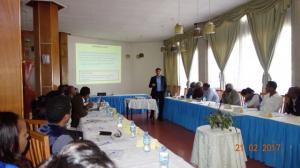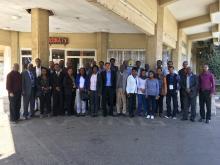Capacity Building Workshop on AEFI Surveillance and Causality Assessment organized in Asmara
The Ministry of Health in collaboration with the WHO Country Office held a workshop on Adverse Event Following Immunization Surveillance and Causality Assessment from 21 to 22 February 2017 at Embasoira Hotel in Asmara-Eritrea. The workshop was modelled on the standard of WHO causality assessment course to strengthen monitoring of adverse events following immunization (AEFI), but modified to suit the country requirements. The workshop covered basics of AEFI surveillance, reporting and recording of AEFI cases, investigation and sample collection, causality assessment, roles of National Committees and District Rapid Response Teams and vaccine safety communications.
Mr Iyassu Bahta, Director of National Medicine and Food Administration officially opened the workshop wishing the training to be “fruitful, rewarding and memorable.” He thanked WHO country office for all the efforts done in organizing and sponsoring the workshop in collaboration with the Ministry of Health programs, i.e. the EPI and the National Pharmacovigilance Centre.
Recognizing the need to promote patient safety as a fundamental principle of the health system, due attention was given by the Ministry of Health to revitalize the Pharmacovigilance activities in Eritrea, said Mr Iyassu. The country was granted associate membership in 2003 and joined the WHO program for International Drug Monitoring with full membership in April 2012; since its revitalization, much has been done with remarkable achievements, he added. Even if Eritrea scored outstanding achievements on the Expanded Program on Immunization, there is some work to be done in areas of vaccine safety surveillance and causality assessment. Moreover, a consolidated and coordinated effort among the key stakeholders for safeguarding the patients and ensuring more confidence on the immunization program has to be in place.
The main objectives of the training were to: appreciate the importance of efficient national vaccine pharmacovigilance system for identifying, reporting, investigating and need to determine the cause of AEFI; harmonise the activities of the key national and subnational institutions dealing with vaccine safety by defining their roles and responsibilities and communication mechanism; identify bottlenecks in AEFI detection and reporting, and propose corrective action; understand the need for consistent case investigation and causality assessment practices applying WHO methods; communicate effectively about vaccine safety.
The workshop was interactive in such a way that there were plenary presentations, discussions and group work. Participants were also familiarized to the AEFI reporting and investigation forms and causality assessment exercises. As part of group exercise, the participants were divided into four groups and provided with two cases to assess causality based on the revised WHO algorithm.
Dr Sujeet Jain, Vaccine Safety expert, WHO IST/ESA facilitated the workshop with support of WHO Country Office, MoH and UNICEF. He shared his rich experiences in areas of AEFI investigation and causality assessment. He made several significant, practical presentations on AEFI basic concepts, Investigational framework for AEFI clusters, immunization safety advisory Committee (ISAC) and vaccine safety data analysis, AEFI causality assessment: case definition and case studies.
During the workshop, the presentations made include EPI background information & course objectives and AEFI recording & reporting, importance of Vaccine Safety Surveillance, Investigation of AEFIs and vaccine risk communication.
The participants for the workshop were from the different relevant departments of the Ministry of Health such as National Health Laboratory, National Medicine and Food Administration, Expanded Program on Immunization and others were from Asmara College of Health Science, WHO and UNICEF.
This workshop marks the launching of establishment of the AEFI committee and the integration of Pharmacovigilance to a Public Health Program, EPI in this case.





